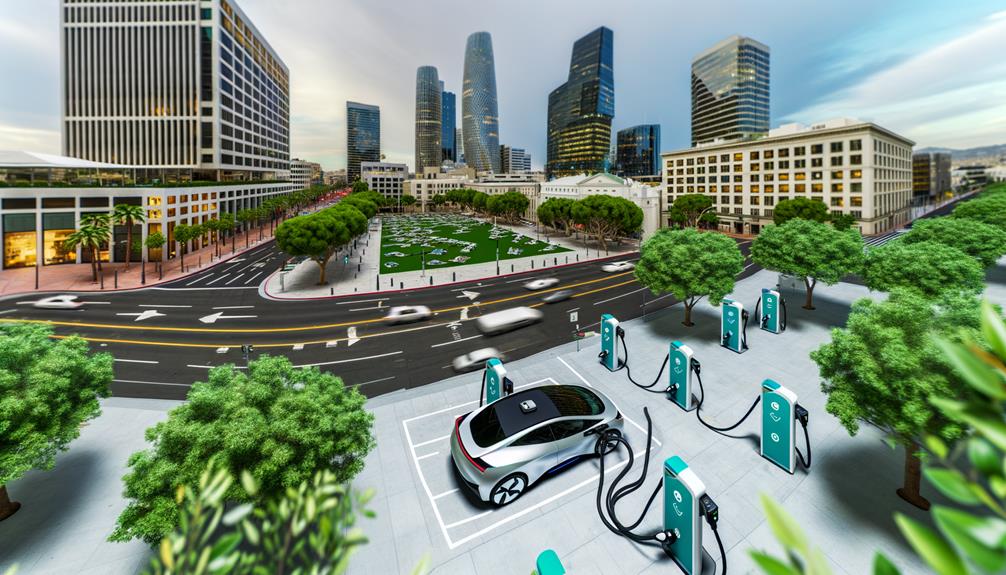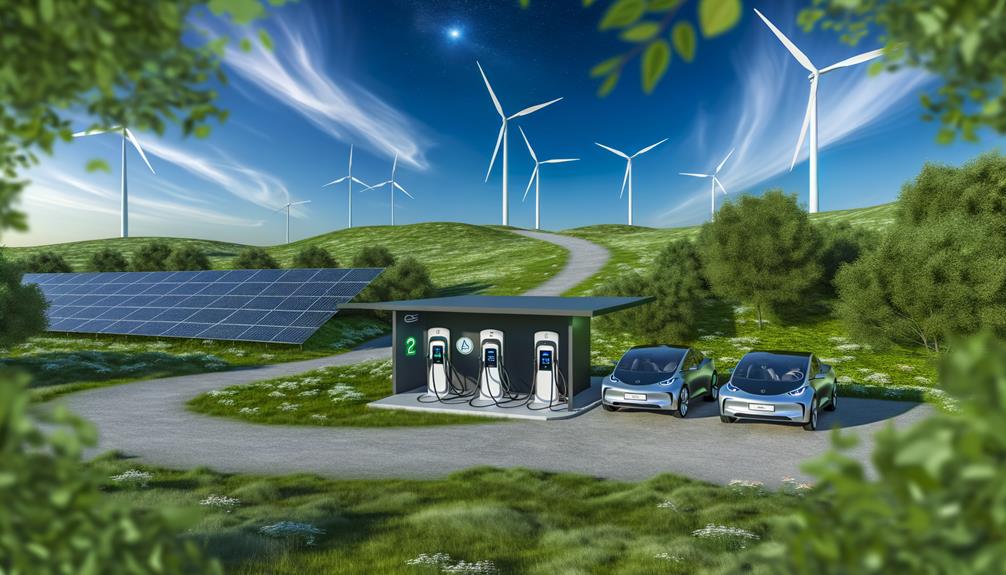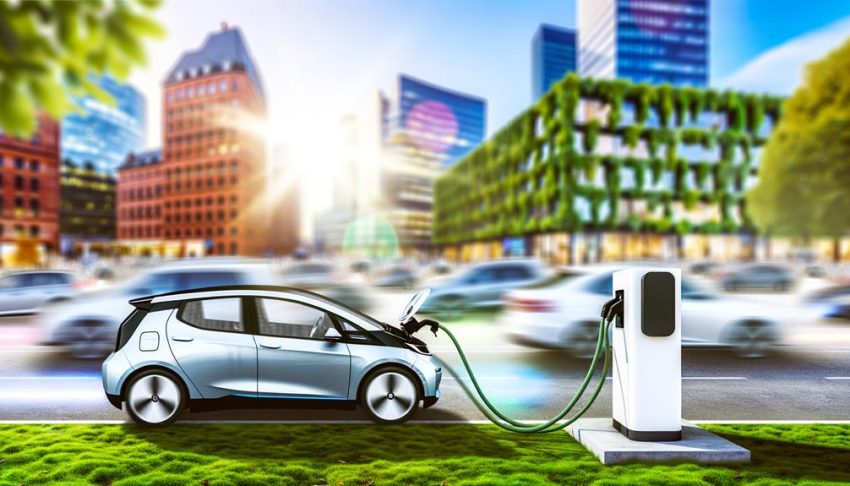When considering the cost of charging stations for electric cars, you might wonder if they're free or if you'll have to pay. The truth is, it varies widely based on where you are and who's providing the service. Some places, like certain retailers and hotels, offer complimentary charging to attract customers and promote sustainability. On the other hand, public charging stations usually charge between $0.30 to $0.60 per kWh. Curious about how you can locate these free charging spots and what the future holds for EV charging infrastructure? There's a lot to explore on this topic.
Contents
Cost of Charging Stations
When evaluating the cost of charging stations for electric vehicles (EVs), several factors come into play. Public charging stations typically charge between $0.30 and $0.60 per kWh. Depending on your vehicle's battery size and the specific charging rates, a full charge can range from $11 to $50. These costs can add up, especially for frequent users.
However, many retailers, hotels, and educational institutions offer free charging as a perk to encourage EV adoption and support sustainability initiatives. While this can reduce your overall charging expenses, it's vital to take into account any associated parking fees that might apply, which could offset the benefits of free charging.
For those contemplating a home charger, the initial cost to install a Level 2 home charger averages around $2,000. However, federal tax credits can offset 30% of these installation costs, making home charging a more economical option in the long run. Home charging also provides the convenience of charging overnight, potentially taking advantage of lower electricity rates, which vary by region and time of day.
Public charging networks often have variable pricing structures. Some offer subscription plans that can greatly reduce the cost to charge for frequent users. It's important to analyze the charging fees associated with different networks to determine which plan best suits your driving habits.
Understanding these costs and options can help you make informed decisions about your EV charging strategy. Whether you're relying on public charging stations, taking advantage of free charging opportunities, or investing in a home charger, being aware of the associated costs and potential savings is fundamental for budgeting and maximizing the benefits of your electric vehicle.
Types of EV Chargers
Exploring the various types of EV chargers can help you better understand which option suits your needs and lifestyle. Each level offers different charging speeds and use cases, impacting how and where you charge your electric vehicle.
- Level 1 Charger: This basic charger uses a standard 120-volt outlet, typically found in most households. Charging at home with a Level 1 Charger can take 8-12 hours for a full charge, making it suitable for overnight charging when time isn't a constraint. It's a cost-effective option but may not meet the needs of frequent drivers due to its slower speed.
- Level 2 Charger: Operating on a 240-volt outlet, a Level 2 Charger charges 4-6 times faster than a Level 1 Charger. These are commonly installed at public EV charging stations, workplaces, and even homes for those who need quicker charging solutions. This makes Level 2 Chargers a versatile choice for both home and public EV charging.
- Level 3 Charger (DC fast chargers): These are designed for rapid charging, often replenishing up to 80% of an EV's battery in about 30 minutes. Ideal for long-distance travel and quick stops, Level 3 Chargers are generally found at highway rest stops and major public areas. They provide a considerable convenience for drivers needing quick top-offs during their journeys.
- Tesla Superchargers: Exclusive to Tesla vehicles, these fast chargers are strategically placed along major highways. Tesla Superchargers can greatly reduce charging time, but rates vary based on location and usage. They are critical for Tesla owners who frequently travel long distances.
Understanding these EV chargers, from Level 1 Chargers to Tesla Superchargers, helps you make informed decisions about your electric vehicle charging needs, whether charging at home or utilizing public EV charging stations.
Finding Free Charging Stations

Finding free charging stations can greatly reduce your overall charging costs and enhance your electric vehicle (EV) ownership experience. By leveraging the right resources and knowing where to look, you can tap into numerous public charging locations that offer complimentary services.
Companies like Macy's and Whole Foods often provide free charging stations for their customers. This not only encourages eco-friendly shopping habits but also promotes longer customer dwell times. Additionally, educational institutions such as colleges and universities support green transportation by offering free EV charging to students and staff.
National parks have also embraced sustainability by installing over 140 chargers across 23 locations. Visitors can explore the outdoors while their vehicles charge at no cost, making it a win-win scenario. Some hotel chains, including select Marriott and Hilton locations, offer free EV charging for guests, adding an extra layer of convenience for travelers.
To efficiently find free charging stations, consider using charging map services like the PlugShare app and ChargeFinder. These platforms provide real-time data on available free EV charging locations, including libraries and museums. The Electrify America network is another resource, although not all of their stations are free, they do list locations that offer complimentary charging.
Benefits of Free Charging
Access to free charging stations offers numerous benefits that markedly enhance the overall electric vehicle (EV) ownership experience. By tapping into these opportunities, you as an electric vehicle owner can substantially save money on charging expenses, making longer trips more feasible without incurring additional costs.
- Cost Savings: Free charging directly reduces your charging expenses, allowing you to allocate those funds elsewhere. For example, retailers like Macy's and Whole Foods provide complimentary charging as a customer incentive, helping you save money while shopping.
- Promoting Sustainability: Institutions such as colleges and universities often support sustainability initiatives by offering free charging to students and staff. This not only encourages EV adoption on campuses but also aligns with broader eco-friendly travel goals, aiding in the reduction of carbon emissions.
- Enhanced Accessibility: Public charging locations, including national parks, are increasingly offering free charging options. This enhances accessibility for EV owners, making eco-friendly travel more convenient and widespread.
- Convenience and Adoption: The availability of free charging improves the overall convenience for EV owners, encouraging more people to switch to electric vehicles. This increased adoption can lead to a notable reduction in carbon emissions, contributing to a cleaner environment.
Future of EV Charging

The future of EV charging is poised to undergo transformative changes, driven by both technological advancements and strategic policy interventions. With the expansion of electric vehicle (EV) charging networks projected to substantially increase by 2030, the integration of renewable energy sources into the charging infrastructure is a key focus. This shift will not only make charging more sustainable but also more efficient, thanks to smart grid technology that optimizes energy consumption during charging.
Government incentives and funding play an essential role in this evolution. By supporting the installation of charging stations, these policies guarantee wider accessibility, making it easier for EV owners to find convenient charging locations. This expansion is particularly beneficial in both urban and rural settings, where enhanced charging infrastructure can also promote local businesses.
A major technological advancement on the horizon is the development of ultra-fast charging technology. These innovations promise to drastically reduce charging times, making long journeys more manageable for EV users. As a result, the convenience factor for EV owners will markedly improve, which is a critical aspect of broader EV adoption.
Here's a closer look at some of the key elements driving the future of EV charging:
| Aspect | Impact |
|---|---|
| Renewable Energy | Integrates sustainable sources, reducing carbon footprint |
| Fast Charging | Reduces time needed to charge, enhancing convenience |
| Government Incentives | Boosts installation of charging stations, increasing accessibility |
| Smart Grid Technology | Optimizes energy consumption, improving efficiency and sustainability |
Frequently Asked Questions
Can You Charge Electric Cars for Free?
You can charge electric cars for free at public stations through incentive programs and local policies. Charging networks, community initiatives, and business partnerships offer alternative options. Cost comparisons show renewable energy sources often power these free charging stations.
How Much Does It Cost to Charge an Electric Car at a Charging Station in the Us?
You'll find charging rates at U.S. stations range from $0.30 to $0.60 per kWh. Costs depend on charging speed, station availability, energy sources, and regional differences. Membership programs, payment methods, and infrastructure development also impact user experiences.
How Much Does It Cost to Charge an Electric Car?
You'll find charging costs vary by charging rates, battery capacity, and energy sources. Home charging's cheaper, while public networks range $0.30-$0.60/kWh. Incentive programs, charging speed, and future trends affect costs. Observe charging etiquette for best experience.
Is Charging an Electric Car Cheaper Than Gas?
Yes, charging an electric car is cheaper than gas. Electric vehicle savings arise from lower charging costs, especially with home charging benefits. Despite gas price fluctuations, battery efficiency advancements and growing charging infrastructure make long-distance travel more economical.
Conclusion
To sum up, while many EV charging stations charge between $0.30 and $0.60 per kWh, free options are increasingly available at retailers, hotels, and educational institutions. Utilizing mapping services like PlugShare can help you locate complimentary charging stations, ultimately lowering your costs and promoting EV adoption. As the industry evolves, the prevalence of free charging options is likely to grow, further incentivizing the shift toward sustainable transportation solutions. It's a smart move for both your wallet and the environment.
